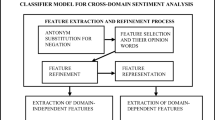Abstract
Here we propose a novel approach for the task of domain adaptation for Natural Language Processing. Our approach captures relations between the source and target domains by applying a model transformation mechanism which can be learnt by using labeled data of limited size taken from the target domain. Experimental results on several Opinion Mining datasets show that our approach significantly outperforms baselines and published systems when the amount of labeled data is extremely small.
Access this chapter
Tax calculation will be finalised at checkout
Purchases are for personal use only
Preview
Unable to display preview. Download preview PDF.
Similar content being viewed by others
References
Daumé III, H., Marcu, D.: Domain adaptation for statistical classifiers. J. Artif. Int. Res. 26, 101–126 (2006)
Kobayashi, N., Inui, K., Matsumoto, Y.: Extracting Aspect-Evaluation and Aspect-of Relations in Opinion Mining. In: Proceedings of the 2007 Joint Conference on Empirical Methods in Natural Language Processing and Computational Natural Language Learning (EMNLP-CoNLL), pp. 1065–1074 (2007)
Joachims, T.: Making Large-Scale Support Vector Machine Learning Practical, pp. 169–184 (1999)
Chelba, C., Acero, A.: Adaptation of Maximum Entropy Capitalizer: Little Data Can Help a lot. Computer Speech & Language 20, 382–399 (2006)
Daumé III, H.: Frustratingly Easy Domain Adaptation. In: Proceedings of the 45th Annual Meeting of the Association of Computational Linguistics, pp. 256–263 (2007)
Ben-David, S., Blitzer, J., Crammer, K., Pereira, F.: Analysis of Representations for Domain Adaptation. In: Advances in Neural Information Processing Systems, vol. 20, MIT Press, Cambridge (2007)
Gupta, R., Sarawagi, S.: Domain Adaptation of Information Extraction Models. SIGMOD Rec. 37, 35–40 (2008)
Pan, S.J., Tsang, I.W., Kwok, J.T., Yang, Q.: Domain Adaptation via Transfer Component Analysis. In: IJCAI, pp. 1187–1192 (2009)
Mansour, Y., Mohri, M., Rostamizadeh, A.: Domain Adaptation with Multiple Sources. In: NIPS, pp. 1041–1048 (2008)
Snyman, J.A.: Practical Mathematical Optimization: An Introduction to Basic Optimization Theory and Classical and New Gradient-Based Algorithms (Applied Optimization). Springer, New York (2005)
Blitzer, J., Dredze, M., Pereira, F.: Biographies, Bollywood, Boom-Boxes and Blenders: Domain Adaptation for Sentiment Classification. In: Proceedings of the 45th Annual Meeting of the Association of Computational Linguistics, pp. 440–447 (2007)
Author information
Authors and Affiliations
Editor information
Editors and Affiliations
Rights and permissions
Copyright information
© 2010 Springer-Verlag Berlin Heidelberg
About this paper
Cite this paper
Ormándi, R., Hegedűs, I., Farkas, R. (2010). Opinion Mining by Transformation-Based Domain Adaptation. In: Sojka, P., Horák, A., Kopeček, I., Pala, K. (eds) Text, Speech and Dialogue. TSD 2010. Lecture Notes in Computer Science(), vol 6231. Springer, Berlin, Heidelberg. https://doi.org/10.1007/978-3-642-15760-8_21
Download citation
DOI: https://doi.org/10.1007/978-3-642-15760-8_21
Publisher Name: Springer, Berlin, Heidelberg
Print ISBN: 978-3-642-15759-2
Online ISBN: 978-3-642-15760-8
eBook Packages: Computer ScienceComputer Science (R0)




